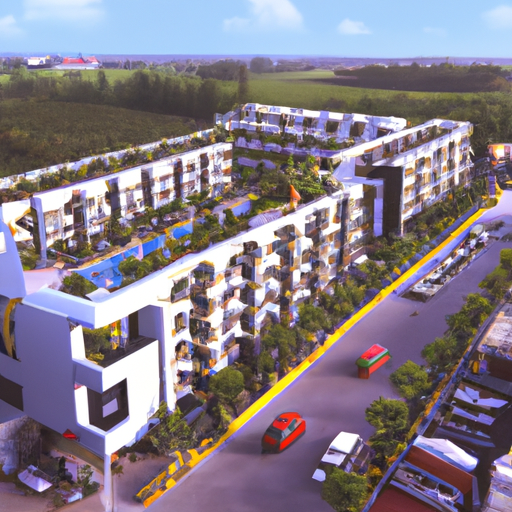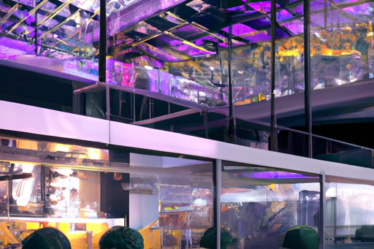
Latest Trends in the Hospitality Industry: September 2023 Update
The hospitality industry is constantly evolving, and it’s important for industry professionals to stay up to date with the latest trends. In this September 2023 update, we will explore some of the most significant trends shaping the hospitality industry.
One of the key trends in the hospitality industry is the rise of experiential travel. Today’s travelers are seeking more than just a place to stay; they want unique experiences that create lasting memories. Hotels are responding to this trend by offering immersive experiences, such as cooking classes with local chefs or guided tours of nearby attractions. By providing these experiences, hotels can differentiate themselves from their competitors and attract a new generation of travelers.
Another trend that is gaining momentum is the focus on sustainability. With increasing awareness of environmental issues, travelers are becoming more conscious of their carbon footprint. Hotels are responding by implementing eco-friendly practices, such as using renewable energy sources, reducing water consumption, and promoting recycling. Not only does this appeal to environmentally conscious travelers, but it also helps hotels reduce their operating costs in the long run.
Technology is also playing a significant role in shaping the hospitality industry. From online booking platforms to mobile check-ins, technology has revolutionized the way hotels operate. In recent years, there has been a surge in the use of artificial intelligence (AI) and automation in the hospitality industry. Chatbots are being used to handle customer inquiries, while AI-powered systems are being used to personalize guest experiences. These technological advancements not only improve efficiency but also enhance the overall guest experience.
Personalization is another trend that is gaining traction in the hospitality industry. Today’s travelers expect a personalized experience tailored to their preferences and needs. Hotels are leveraging data and technology to gather information about their guests and provide personalized recommendations and services. From customized room amenities to personalized itineraries, hotels are going the extra mile to make each guest feel special.
The COVID-19 pandemic has had a profound impact on the hospitality industry, and it continues to shape the way hotels operate. Health and safety protocols have become a top priority for hotels, with enhanced cleaning procedures and contactless services becoming the new norm. Hotels are also investing in technology to enable touchless experiences, such as mobile keyless entry and contactless payments. As travel restrictions ease and more people start to travel again, hotels are adapting to the new normal to ensure the safety and well-being of their guests.
In conclusion, the hospitality industry is constantly evolving, and staying up to date with the latest trends is crucial for industry professionals. From experiential travel to sustainability, technology, personalization, and health and safety protocols, these trends are shaping the way hotels operate and cater to the needs of today’s travelers. By embracing these trends, hotels can stay ahead of the competition and provide exceptional experiences for their guests.
Impact of Technology on the Hotel and Hospitality Sector: September 2023 Update

The hotel and hospitality sector has always been at the forefront of embracing new technologies to enhance guest experiences and streamline operations. In September 2023, the impact of technology on this industry continues to be significant, with several exciting developments taking place.
One of the most notable advancements is the widespread adoption of artificial intelligence (AI) and machine learning. Hotels are increasingly using AI-powered chatbots to handle customer inquiries and provide personalized recommendations. These chatbots are capable of understanding natural language and can assist guests with everything from booking a room to ordering room service. This technology not only improves efficiency but also enhances the overall guest experience by providing instant and accurate responses.
Another area where technology is making a big impact is in the realm of guest personalization. Hotels are leveraging data analytics and machine learning algorithms to gain insights into guest preferences and behavior. This allows them to offer tailored recommendations and personalized experiences. For example, hotels can use data to anticipate a guest’s preferred room temperature, preferred amenities, and even their preferred type of pillow. By anticipating and meeting these preferences, hotels can create a truly personalized and memorable stay for their guests.
In addition to AI and personalization, the use of smart devices and Internet of Things (IoT) technology is also on the rise in the hotel industry. Smart devices such as voice assistants and smart thermostats are being integrated into hotel rooms, allowing guests to control various aspects of their stay with simple voice commands. This not only adds convenience for guests but also helps hotels optimize energy usage and reduce costs.
Furthermore, technology is revolutionizing the way hotels manage their operations. Cloud-based property management systems (PMS) are becoming increasingly popular, allowing hotel staff to access real-time information from anywhere, at any time. This enables seamless communication between different departments and improves overall efficiency. Additionally, hotels are utilizing data analytics to optimize revenue management, pricing, and inventory control. By analyzing historical data and market trends, hotels can make informed decisions to maximize profitability.
The impact of technology is not limited to the guest experience and operations; it also extends to sustainability efforts within the hotel industry. Hotels are increasingly adopting eco-friendly practices and utilizing technology to reduce their environmental footprint. For instance, energy management systems are being implemented to monitor and control energy usage, while smart sensors are used to detect occupancy and adjust lighting and temperature accordingly. These initiatives not only benefit the environment but also help hotels reduce costs in the long run.
In conclusion, the hotel and hospitality sector continues to be transformed by technology in September 2023. From AI-powered chatbots to personalized experiences, smart devices, and cloud-based systems, technology is revolutionizing every aspect of the industry. Hotels are leveraging these advancements to enhance guest experiences, streamline operations, and contribute to sustainability efforts. As technology continues to evolve, we can expect even more exciting developments in the future, further enhancing the hotel and hospitality sector.
Emerging Investment Opportunities in the Hotel and Hospitality Market: September 2023 Update
Welcome to the September 2023 update of the HVS ANAROCK Hotels & Hospitality Overview. In this section, we will be discussing the emerging investment opportunities in the hotel and hospitality market. So, let’s dive right in!
The hotel and hospitality industry has always been a lucrative sector for investors. However, with the recent global events, the market has seen a significant shift in investment opportunities. As the world slowly recovers from the pandemic, new trends and opportunities are emerging, presenting investors with exciting prospects.
One of the most prominent investment opportunities in the hotel and hospitality market is the rise of boutique hotels. These unique and personalized accommodations have gained popularity among travelers who seek a more intimate and authentic experience. Boutique hotels offer a sense of exclusivity and charm that larger chain hotels often lack. With the growing demand for these boutique experiences, investors have a chance to capitalize on this trend by investing in or developing boutique hotels in popular tourist destinations.
Another emerging investment opportunity lies in the wellness and spa sector. As people become more health-conscious and prioritize self-care, wellness retreats and spa resorts have become increasingly popular. These establishments offer a range of services, including yoga retreats, meditation programs, and holistic treatments. Investing in wellness and spa resorts can be a profitable venture, as more individuals seek to rejuvenate and recharge in serene and luxurious environments.
Furthermore, the rise of eco-friendly and sustainable tourism presents a unique investment opportunity. Travelers are now more conscious of their environmental impact and are actively seeking accommodations that align with their values. Investing in eco-friendly hotels and resorts can not only attract environmentally conscious travelers but also contribute to the preservation of natural resources. By incorporating sustainable practices such as energy-efficient systems, waste reduction, and locally sourced materials, investors can tap into this growing market and make a positive impact on the environment.
Additionally, the digital transformation of the hotel and hospitality industry has opened up new investment avenues. With the increasing reliance on technology, investing in smart hotels and digital solutions can be highly profitable. Smart hotels utilize advanced technologies such as automated check-ins, keyless entry systems, and personalized guest experiences through mobile apps. By investing in these technologies, hotel owners can enhance operational efficiency, improve guest satisfaction, and stay ahead of the competition.
Lastly, the emergence of remote work and digital nomadism has created a demand for co-living and co-working spaces. As more individuals choose to work remotely, the need for flexible and productive work environments has grown. Investing in co-living and co-working spaces within hotels can cater to this market segment. These spaces provide a blend of comfortable accommodations and well-equipped workspaces, allowing digital nomads to work and live in a vibrant community of like-minded individuals.
In conclusion, the hotel and hospitality market is brimming with emerging investment opportunities. From boutique hotels to wellness retreats, eco-friendly accommodations to smart hotels, and co-living/co-working spaces, investors have a wide range of options to explore. By staying attuned to the latest trends and consumer preferences, investors can make informed decisions and capitalize on these exciting opportunities. So, whether you’re a seasoned investor or a newcomer to the industry, now is the time to seize these emerging investment prospects in the hotel and hospitality market.


